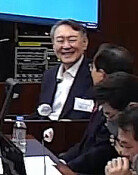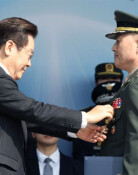Electioneering Fines Deter Vote-Buying
Electioneering Fines Deter Vote-Buying
Posted May. 09, 2006 04:18,
Choi (48), who is a representative of an apartment complex in Jeonju, North Jeolla Province, hurriedly left a restaurant where she had a dinner with her friend early this month because her friends husband, a candidate for the upcoming local election, joined the dinner.
Choi said I was afraid of paying the penalty for receiving a dinner gift from a candidate, so I was in a rush to leave the restaurant.
Although there were scandals involving party nomination donations, there seem little signs of money electioneering, the common practice of showering money and entertainment upon voters. This is thanks to the new system that those who received money from a candidate should cough up a penalty 50 times the amount they received.
Effective Penalty-
Due in part to repeated news reports, voters in general are aware that if they are caught being treated by a candidate, they will face shame and heavy penalty.
A candidate for a local administrator position in Daejeon said, Even elderly women say dont give me anything. Ill pay 50 times. The law is really effective. A 70-something living in Euiseong-gun, North Gyeongsang Province, said, As recently as four years ago, candidates came to give money to us, but now nobody wants money from a candidate.
Reasons for the heavy penalty vary: being treated to a dinner, letting a candidate pay for karaoke expenses, buying an 8,000 won poetry book at a discounted price of 1,000 to 4,000 won, or receiving an 8,000 won plant as a gift for opening a store.
In Naju, South Jeolla Province, 289 people have been penalized for 270 million won in total for receiving 19,000 won plants on New Years Day this year from a candidate for city government post.
According to the National Election Commission, as of yesterday, a total of 41 cases were caught and 676 million won in fines has been imposed.
Reversely, candidates are painstakingly turning down donations from their supporters.
A local administrator candidate in South Gyeongsang Province is refusing to accept 30,000 to 50,000 won donations for managing the campaign office from supporters, saying, I can accept rice cake or beverages instead. Even a small amount of money without proper documents like a due bill can constitute an illegal election contribution and annul an election when being caught by the commission.
Campaign Expenses-
A candidate in Daejeon said A candidate nominated by his political party will have to pay similar amount of money before and after the election. It costs approximately same amount of money for party nomination and for election. Considering legally acceptable election campaign expenses are 150 to 300 million won, a candidate needs 300 to 600 million won.
Monetary scandals often arise from party nominations. It is openly known that it costs a large sum of money to recruit and organize party members in preparation for a primary election. Many brokers demand money for primary elections, said a candidate in South Jeolla Province.
Most election law violations caught by the commission were involved in paying small amount of money for a meal or transportation in the process of recruiting party members. It is assumed that a fairly large sum of money was spent when party management expenses and party nomination donations are included.
An independent candidate for a local administrator in Daegu said Candidates who paid 70 to 80 percent for primary elections find them in short of campaign funds in elections.
Once winning primary election and registering as the candidate, candidates can use a limited amount of campaign funds. When they win more than 15 percent of the vote, the government will compensate the expenses.
Cho Yeong-gyu, candidate of Grand National Party for Haman-gun governor in South Gyeongsang Province, posted on a website that he spent 17 million won for name cards, a tablet at the campaign office and banners among 113 million won of legally-permitted campaign expenses, from March 19 when he registered as a candidate to May 8. The expenses will exceed 100 million won for electioneering tour vehicles and election campaign staff, said Cho.
Some candidates announced their campaign incomes and expenses on their web pages in the national election commission. The commissions thorough inspection follows.




![지하철 타고 가는 북한산성…외국인도 반한 ‘K등산 맛집’[전승훈 기자의 아트로드]](https://dimg.donga.com/c/138/175/90/1/wps/NEWS/IMAGE/2026/01/10/133120824.1.jpg)


